Validity of contract for transfer of beach and unfair contract under Australian Consumer Law
VerifiedAdded on 2023/06/04
|6
|2472
|452
AI Summary
This article discusses the validity of a contract for the transfer of a beach and an unfair contract under the Australian Consumer Law. It covers relevant laws, their application, and conclusions. The article also includes a bibliography.
Contribute Materials
Your contribution can guide someone’s learning journey. Share your
documents today.
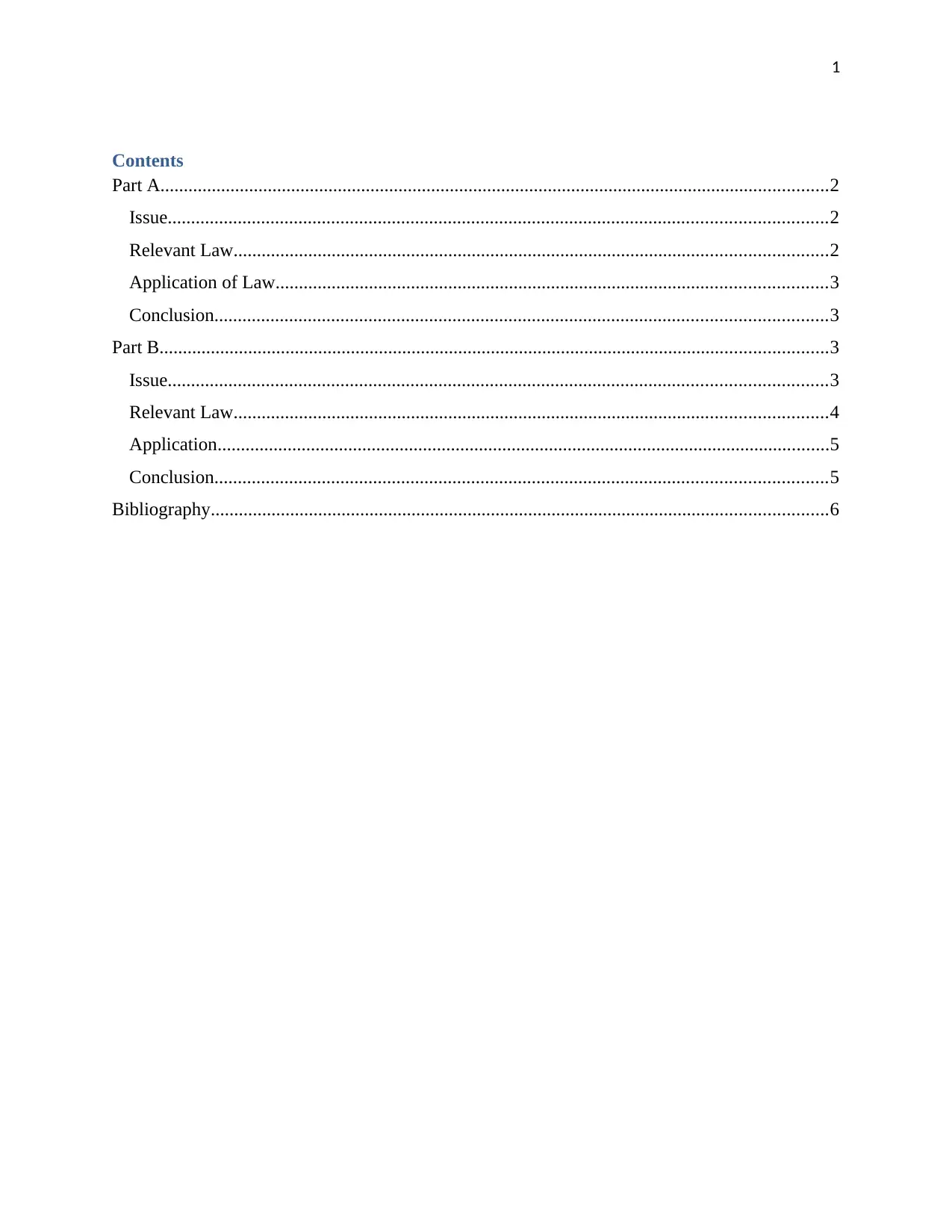
1
Contents
Part A...............................................................................................................................................2
Issue.............................................................................................................................................2
Relevant Law...............................................................................................................................2
Application of Law......................................................................................................................3
Conclusion...................................................................................................................................3
Part B...............................................................................................................................................3
Issue.............................................................................................................................................3
Relevant Law...............................................................................................................................4
Application...................................................................................................................................5
Conclusion...................................................................................................................................5
Bibliography....................................................................................................................................6
Contents
Part A...............................................................................................................................................2
Issue.............................................................................................................................................2
Relevant Law...............................................................................................................................2
Application of Law......................................................................................................................3
Conclusion...................................................................................................................................3
Part B...............................................................................................................................................3
Issue.............................................................................................................................................3
Relevant Law...............................................................................................................................4
Application...................................................................................................................................5
Conclusion...................................................................................................................................5
Bibliography....................................................................................................................................6
Secure Best Marks with AI Grader
Need help grading? Try our AI Grader for instant feedback on your assignments.
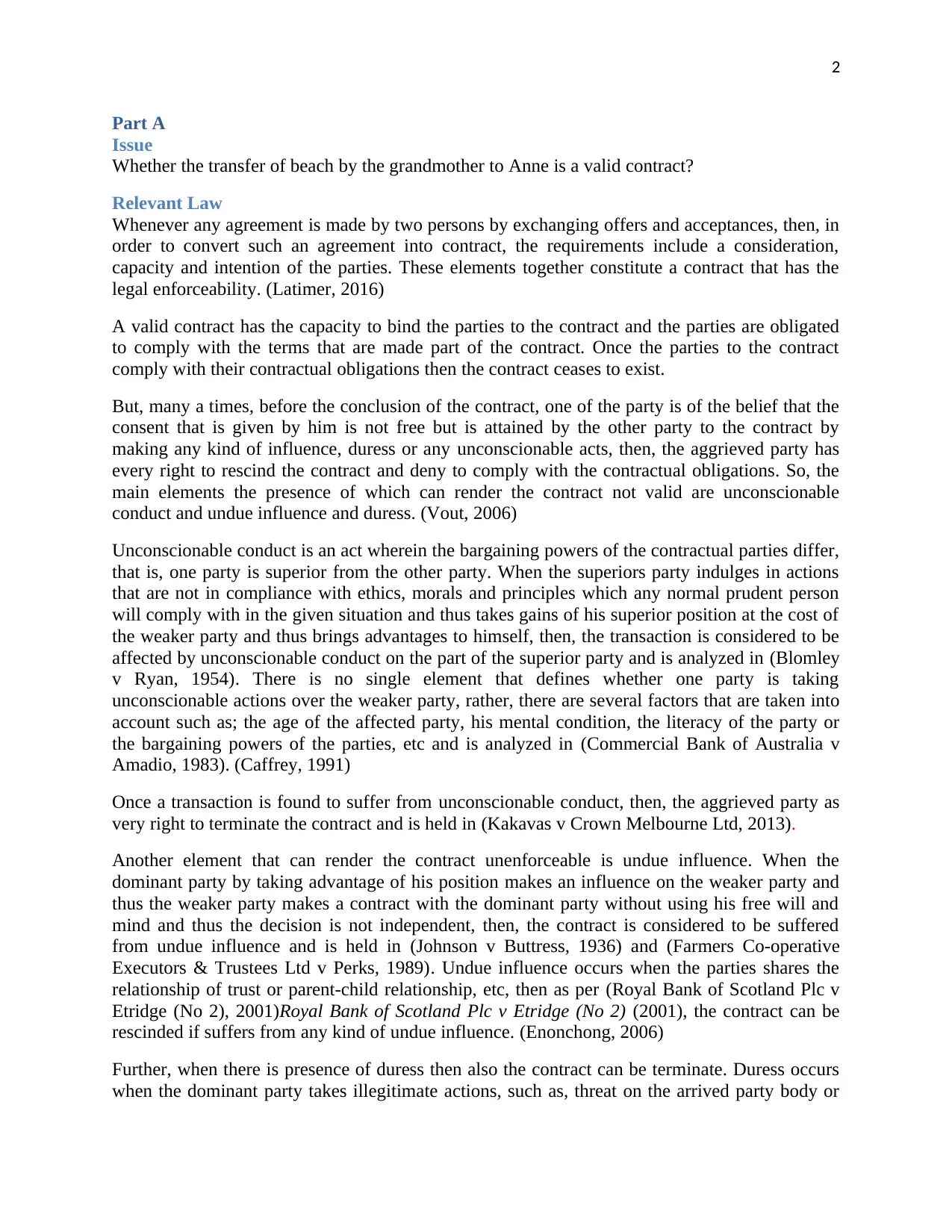
2
Part A
Issue
Whether the transfer of beach by the grandmother to Anne is a valid contract?
Relevant Law
Whenever any agreement is made by two persons by exchanging offers and acceptances, then, in
order to convert such an agreement into contract, the requirements include a consideration,
capacity and intention of the parties. These elements together constitute a contract that has the
legal enforceability. (Latimer, 2016)
A valid contract has the capacity to bind the parties to the contract and the parties are obligated
to comply with the terms that are made part of the contract. Once the parties to the contract
comply with their contractual obligations then the contract ceases to exist.
But, many a times, before the conclusion of the contract, one of the party is of the belief that the
consent that is given by him is not free but is attained by the other party to the contract by
making any kind of influence, duress or any unconscionable acts, then, the aggrieved party has
every right to rescind the contract and deny to comply with the contractual obligations. So, the
main elements the presence of which can render the contract not valid are unconscionable
conduct and undue influence and duress. (Vout, 2006)
Unconscionable conduct is an act wherein the bargaining powers of the contractual parties differ,
that is, one party is superior from the other party. When the superiors party indulges in actions
that are not in compliance with ethics, morals and principles which any normal prudent person
will comply with in the given situation and thus takes gains of his superior position at the cost of
the weaker party and thus brings advantages to himself, then, the transaction is considered to be
affected by unconscionable conduct on the part of the superior party and is analyzed in (Blomley
v Ryan, 1954). There is no single element that defines whether one party is taking
unconscionable actions over the weaker party, rather, there are several factors that are taken into
account such as; the age of the affected party, his mental condition, the literacy of the party or
the bargaining powers of the parties, etc and is analyzed in (Commercial Bank of Australia v
Amadio, 1983). (Caffrey, 1991)
Once a transaction is found to suffer from unconscionable conduct, then, the aggrieved party as
very right to terminate the contract and is held in (Kakavas v Crown Melbourne Ltd, 2013).
Another element that can render the contract unenforceable is undue influence. When the
dominant party by taking advantage of his position makes an influence on the weaker party and
thus the weaker party makes a contract with the dominant party without using his free will and
mind and thus the decision is not independent, then, the contract is considered to be suffered
from undue influence and is held in (Johnson v Buttress, 1936) and (Farmers Co-operative
Executors & Trustees Ltd v Perks, 1989). Undue influence occurs when the parties shares the
relationship of trust or parent-child relationship, etc, then as per (Royal Bank of Scotland Plc v
Etridge (No 2), 2001)Royal Bank of Scotland Plc v Etridge (No 2) (2001), the contract can be
rescinded if suffers from any kind of undue influence. (Enonchong, 2006)
Further, when there is presence of duress then also the contract can be terminate. Duress occurs
when the dominant party takes illegitimate actions, such as, threat on the arrived party body or
Part A
Issue
Whether the transfer of beach by the grandmother to Anne is a valid contract?
Relevant Law
Whenever any agreement is made by two persons by exchanging offers and acceptances, then, in
order to convert such an agreement into contract, the requirements include a consideration,
capacity and intention of the parties. These elements together constitute a contract that has the
legal enforceability. (Latimer, 2016)
A valid contract has the capacity to bind the parties to the contract and the parties are obligated
to comply with the terms that are made part of the contract. Once the parties to the contract
comply with their contractual obligations then the contract ceases to exist.
But, many a times, before the conclusion of the contract, one of the party is of the belief that the
consent that is given by him is not free but is attained by the other party to the contract by
making any kind of influence, duress or any unconscionable acts, then, the aggrieved party has
every right to rescind the contract and deny to comply with the contractual obligations. So, the
main elements the presence of which can render the contract not valid are unconscionable
conduct and undue influence and duress. (Vout, 2006)
Unconscionable conduct is an act wherein the bargaining powers of the contractual parties differ,
that is, one party is superior from the other party. When the superiors party indulges in actions
that are not in compliance with ethics, morals and principles which any normal prudent person
will comply with in the given situation and thus takes gains of his superior position at the cost of
the weaker party and thus brings advantages to himself, then, the transaction is considered to be
affected by unconscionable conduct on the part of the superior party and is analyzed in (Blomley
v Ryan, 1954). There is no single element that defines whether one party is taking
unconscionable actions over the weaker party, rather, there are several factors that are taken into
account such as; the age of the affected party, his mental condition, the literacy of the party or
the bargaining powers of the parties, etc and is analyzed in (Commercial Bank of Australia v
Amadio, 1983). (Caffrey, 1991)
Once a transaction is found to suffer from unconscionable conduct, then, the aggrieved party as
very right to terminate the contract and is held in (Kakavas v Crown Melbourne Ltd, 2013).
Another element that can render the contract unenforceable is undue influence. When the
dominant party by taking advantage of his position makes an influence on the weaker party and
thus the weaker party makes a contract with the dominant party without using his free will and
mind and thus the decision is not independent, then, the contract is considered to be suffered
from undue influence and is held in (Johnson v Buttress, 1936) and (Farmers Co-operative
Executors & Trustees Ltd v Perks, 1989). Undue influence occurs when the parties shares the
relationship of trust or parent-child relationship, etc, then as per (Royal Bank of Scotland Plc v
Etridge (No 2), 2001)Royal Bank of Scotland Plc v Etridge (No 2) (2001), the contract can be
rescinded if suffers from any kind of undue influence. (Enonchong, 2006)
Further, when there is presence of duress then also the contract can be terminate. Duress occurs
when the dominant party takes illegitimate actions, such as, threat on the arrived party body or
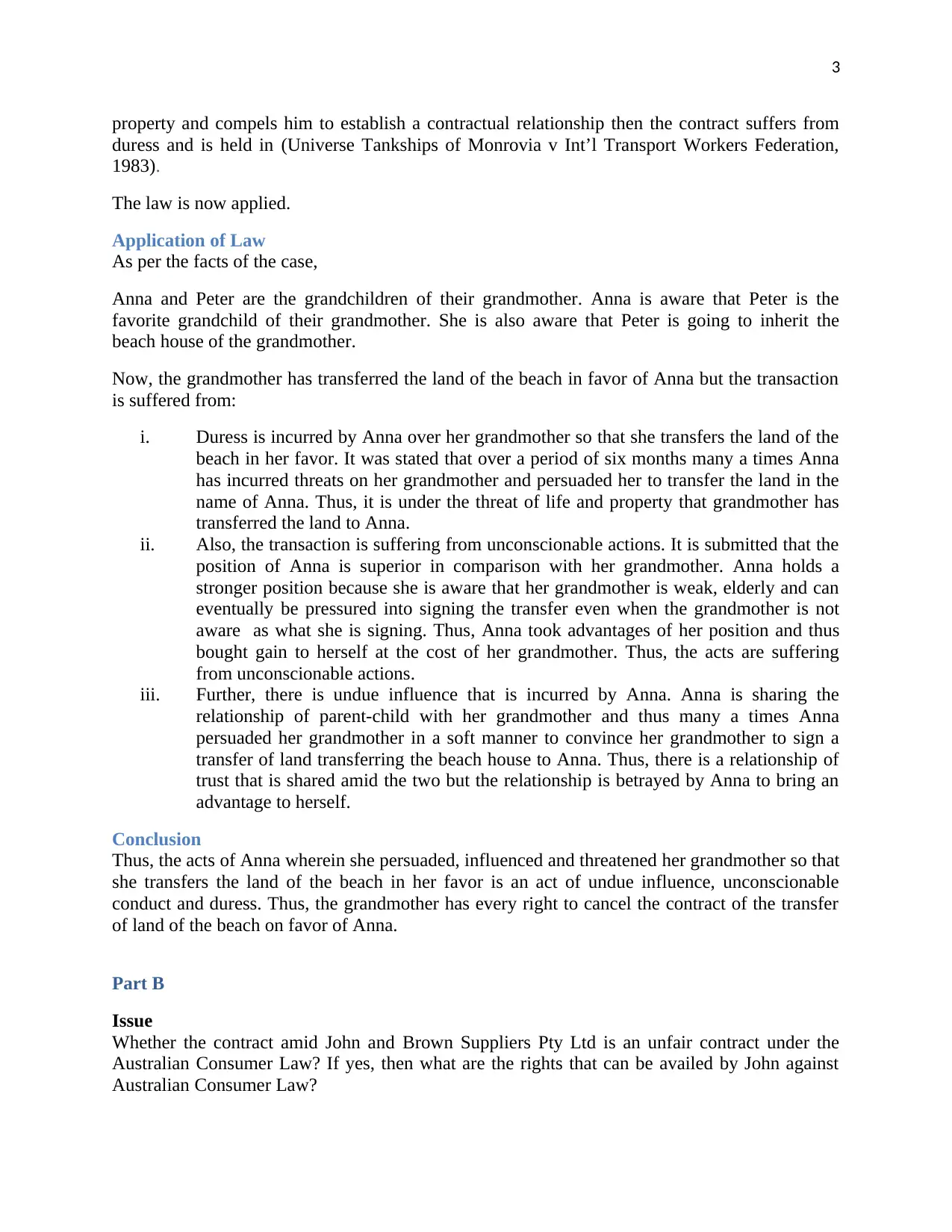
3
property and compels him to establish a contractual relationship then the contract suffers from
duress and is held in (Universe Tankships of Monrovia v Int’l Transport Workers Federation,
1983).
The law is now applied.
Application of Law
As per the facts of the case,
Anna and Peter are the grandchildren of their grandmother. Anna is aware that Peter is the
favorite grandchild of their grandmother. She is also aware that Peter is going to inherit the
beach house of the grandmother.
Now, the grandmother has transferred the land of the beach in favor of Anna but the transaction
is suffered from:
i. Duress is incurred by Anna over her grandmother so that she transfers the land of the
beach in her favor. It was stated that over a period of six months many a times Anna
has incurred threats on her grandmother and persuaded her to transfer the land in the
name of Anna. Thus, it is under the threat of life and property that grandmother has
transferred the land to Anna.
ii. Also, the transaction is suffering from unconscionable actions. It is submitted that the
position of Anna is superior in comparison with her grandmother. Anna holds a
stronger position because she is aware that her grandmother is weak, elderly and can
eventually be pressured into signing the transfer even when the grandmother is not
aware as what she is signing. Thus, Anna took advantages of her position and thus
bought gain to herself at the cost of her grandmother. Thus, the acts are suffering
from unconscionable actions.
iii. Further, there is undue influence that is incurred by Anna. Anna is sharing the
relationship of parent-child with her grandmother and thus many a times Anna
persuaded her grandmother in a soft manner to convince her grandmother to sign a
transfer of land transferring the beach house to Anna. Thus, there is a relationship of
trust that is shared amid the two but the relationship is betrayed by Anna to bring an
advantage to herself.
Conclusion
Thus, the acts of Anna wherein she persuaded, influenced and threatened her grandmother so that
she transfers the land of the beach in her favor is an act of undue influence, unconscionable
conduct and duress. Thus, the grandmother has every right to cancel the contract of the transfer
of land of the beach on favor of Anna.
Part B
Issue
Whether the contract amid John and Brown Suppliers Pty Ltd is an unfair contract under the
Australian Consumer Law? If yes, then what are the rights that can be availed by John against
Australian Consumer Law?
property and compels him to establish a contractual relationship then the contract suffers from
duress and is held in (Universe Tankships of Monrovia v Int’l Transport Workers Federation,
1983).
The law is now applied.
Application of Law
As per the facts of the case,
Anna and Peter are the grandchildren of their grandmother. Anna is aware that Peter is the
favorite grandchild of their grandmother. She is also aware that Peter is going to inherit the
beach house of the grandmother.
Now, the grandmother has transferred the land of the beach in favor of Anna but the transaction
is suffered from:
i. Duress is incurred by Anna over her grandmother so that she transfers the land of the
beach in her favor. It was stated that over a period of six months many a times Anna
has incurred threats on her grandmother and persuaded her to transfer the land in the
name of Anna. Thus, it is under the threat of life and property that grandmother has
transferred the land to Anna.
ii. Also, the transaction is suffering from unconscionable actions. It is submitted that the
position of Anna is superior in comparison with her grandmother. Anna holds a
stronger position because she is aware that her grandmother is weak, elderly and can
eventually be pressured into signing the transfer even when the grandmother is not
aware as what she is signing. Thus, Anna took advantages of her position and thus
bought gain to herself at the cost of her grandmother. Thus, the acts are suffering
from unconscionable actions.
iii. Further, there is undue influence that is incurred by Anna. Anna is sharing the
relationship of parent-child with her grandmother and thus many a times Anna
persuaded her grandmother in a soft manner to convince her grandmother to sign a
transfer of land transferring the beach house to Anna. Thus, there is a relationship of
trust that is shared amid the two but the relationship is betrayed by Anna to bring an
advantage to herself.
Conclusion
Thus, the acts of Anna wherein she persuaded, influenced and threatened her grandmother so that
she transfers the land of the beach in her favor is an act of undue influence, unconscionable
conduct and duress. Thus, the grandmother has every right to cancel the contract of the transfer
of land of the beach on favor of Anna.
Part B
Issue
Whether the contract amid John and Brown Suppliers Pty Ltd is an unfair contract under the
Australian Consumer Law? If yes, then what are the rights that can be availed by John against
Australian Consumer Law?

4
Relevant Law
In order to protect the interest of the consumers at the hands of the suppliers and the
manufacturers, the Australian Consumer law is enacted. As per section 3 of the ACL, any person
who purchases goods and services for personal use for the value not exceeding $40,000 then
such person is called consumer. Every manufacturer and the supplier as define under section 7 of
the ACL are liable to protect the interest of the consumers. (Latimer, 2016)
However, the consumers are also safeguarded from any contract terms that are considered to be
unfair in nature. The terms that are considered to be unfair in nature cannot be comply with by
any consumer provided the said term is made part of the consumer contract as per section 23 (3)
of the ACL and which is a standard form contract.
Thus, it is important to understand the concept of a consumer contract and standard form
contract.
A contract is considered to be a consumer contract when the person purchases goods or seek
services from the supplier or the manufacturer for the personal use or for domestic purposes and
not for any commercial activity.
Now, when one party to the contract frames all the terms of the contract without getting into
negotiations with the other party to the contract and the only option that is left to the other party
is either to accept the contract pr to reject the contract, then, such contracts are considered to be
standard form of contract. There is no single factor that helps in defining whether a contract is a
standard form contract but as per section 27 (2) of the Act some of the factors that govern are
that firstly, when the party who is formulating the cont5ract has not considered the essential
features of the other party; secondly, when the party who is making the contract has makes a
distinction in the bargaining powers and assume all the essential powers; thirdly, when no
opportunity is given to the other party so as to negotiate the terms of the contract, fourthly, when
the other party can either accept the terms or reject the terms but has no option to bring changes
to the term, then, in such situation, the contracts that is established is the standard form of
contract.
Also, as per section 24 (1) the concept of an unfair term is analyzed and it is considered as such
terms which does not bring balance amid the rights/obligations of the parties. when the terms
bring advantage to one party of the contract at the cost of the other party then such term are
considered to be unfair in nature and is held in (Director of Consumer Affairs Victoria v AAPT
Ltd (Civil Claims), 2006).
Once a standard consumer contract is framed by the party and such a contract contains a term
that is found to be not fair in nature, then, such unfair term can be considered as unenforceable in
law and thus void in nature. if from all the terms of the contract, the unfair term can be
segregated then not whole of the contract is declared void, but, only the unfair term is considered
to be inoperative in nature and is established under section 23 (1) of the act and is analyzed in
(Monroe Topple & Associates Pty Ltd v Institute of Chartered Accountants in Australia , 2002).
The law is now applied.
Relevant Law
In order to protect the interest of the consumers at the hands of the suppliers and the
manufacturers, the Australian Consumer law is enacted. As per section 3 of the ACL, any person
who purchases goods and services for personal use for the value not exceeding $40,000 then
such person is called consumer. Every manufacturer and the supplier as define under section 7 of
the ACL are liable to protect the interest of the consumers. (Latimer, 2016)
However, the consumers are also safeguarded from any contract terms that are considered to be
unfair in nature. The terms that are considered to be unfair in nature cannot be comply with by
any consumer provided the said term is made part of the consumer contract as per section 23 (3)
of the ACL and which is a standard form contract.
Thus, it is important to understand the concept of a consumer contract and standard form
contract.
A contract is considered to be a consumer contract when the person purchases goods or seek
services from the supplier or the manufacturer for the personal use or for domestic purposes and
not for any commercial activity.
Now, when one party to the contract frames all the terms of the contract without getting into
negotiations with the other party to the contract and the only option that is left to the other party
is either to accept the contract pr to reject the contract, then, such contracts are considered to be
standard form of contract. There is no single factor that helps in defining whether a contract is a
standard form contract but as per section 27 (2) of the Act some of the factors that govern are
that firstly, when the party who is formulating the cont5ract has not considered the essential
features of the other party; secondly, when the party who is making the contract has makes a
distinction in the bargaining powers and assume all the essential powers; thirdly, when no
opportunity is given to the other party so as to negotiate the terms of the contract, fourthly, when
the other party can either accept the terms or reject the terms but has no option to bring changes
to the term, then, in such situation, the contracts that is established is the standard form of
contract.
Also, as per section 24 (1) the concept of an unfair term is analyzed and it is considered as such
terms which does not bring balance amid the rights/obligations of the parties. when the terms
bring advantage to one party of the contract at the cost of the other party then such term are
considered to be unfair in nature and is held in (Director of Consumer Affairs Victoria v AAPT
Ltd (Civil Claims), 2006).
Once a standard consumer contract is framed by the party and such a contract contains a term
that is found to be not fair in nature, then, such unfair term can be considered as unenforceable in
law and thus void in nature. if from all the terms of the contract, the unfair term can be
segregated then not whole of the contract is declared void, but, only the unfair term is considered
to be inoperative in nature and is established under section 23 (1) of the act and is analyzed in
(Monroe Topple & Associates Pty Ltd v Institute of Chartered Accountants in Australia , 2002).
The law is now applied.
Secure Best Marks with AI Grader
Need help grading? Try our AI Grader for instant feedback on your assignments.
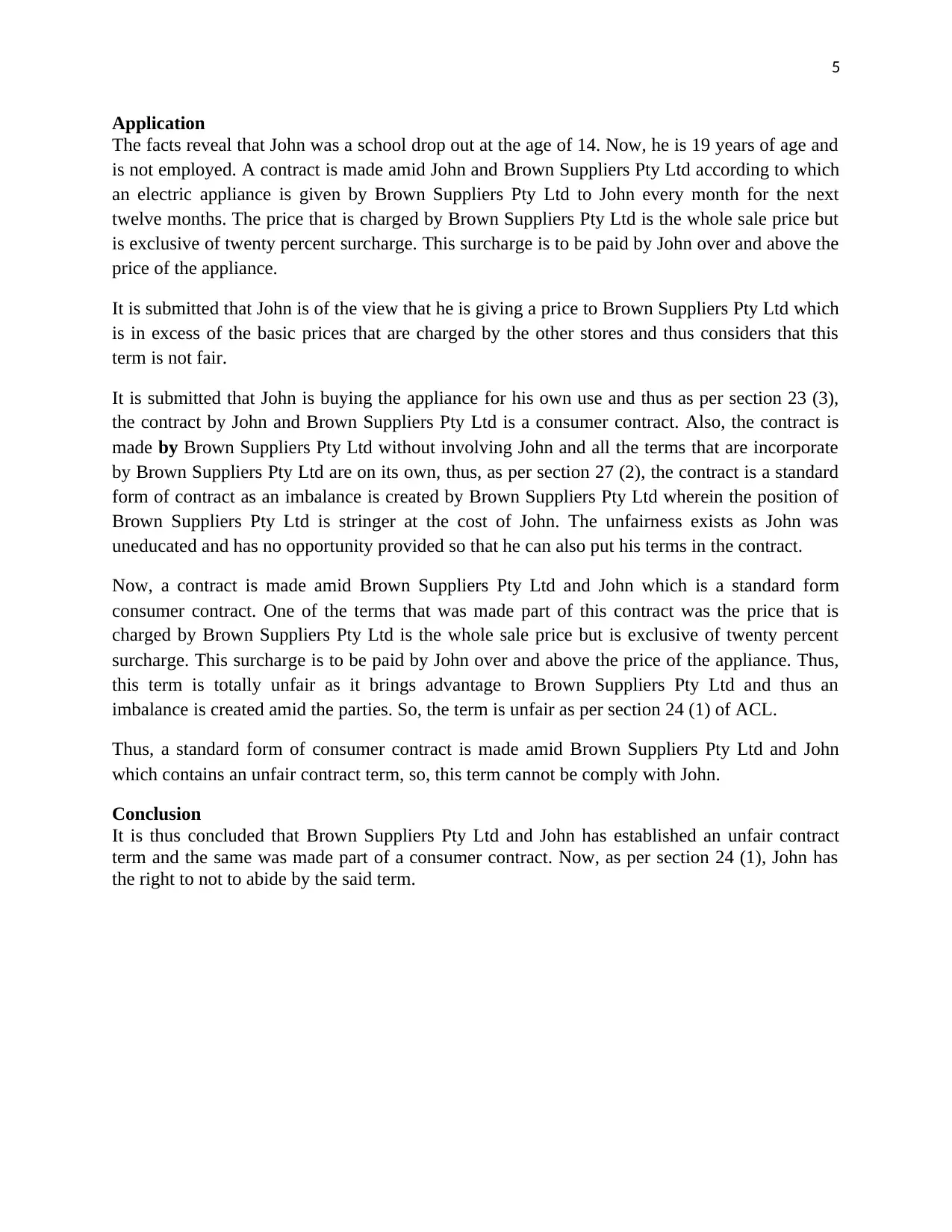
5
Application
The facts reveal that John was a school drop out at the age of 14. Now, he is 19 years of age and
is not employed. A contract is made amid John and Brown Suppliers Pty Ltd according to which
an electric appliance is given by Brown Suppliers Pty Ltd to John every month for the next
twelve months. The price that is charged by Brown Suppliers Pty Ltd is the whole sale price but
is exclusive of twenty percent surcharge. This surcharge is to be paid by John over and above the
price of the appliance.
It is submitted that John is of the view that he is giving a price to Brown Suppliers Pty Ltd which
is in excess of the basic prices that are charged by the other stores and thus considers that this
term is not fair.
It is submitted that John is buying the appliance for his own use and thus as per section 23 (3),
the contract by John and Brown Suppliers Pty Ltd is a consumer contract. Also, the contract is
made by Brown Suppliers Pty Ltd without involving John and all the terms that are incorporate
by Brown Suppliers Pty Ltd are on its own, thus, as per section 27 (2), the contract is a standard
form of contract as an imbalance is created by Brown Suppliers Pty Ltd wherein the position of
Brown Suppliers Pty Ltd is stringer at the cost of John. The unfairness exists as John was
uneducated and has no opportunity provided so that he can also put his terms in the contract.
Now, a contract is made amid Brown Suppliers Pty Ltd and John which is a standard form
consumer contract. One of the terms that was made part of this contract was the price that is
charged by Brown Suppliers Pty Ltd is the whole sale price but is exclusive of twenty percent
surcharge. This surcharge is to be paid by John over and above the price of the appliance. Thus,
this term is totally unfair as it brings advantage to Brown Suppliers Pty Ltd and thus an
imbalance is created amid the parties. So, the term is unfair as per section 24 (1) of ACL.
Thus, a standard form of consumer contract is made amid Brown Suppliers Pty Ltd and John
which contains an unfair contract term, so, this term cannot be comply with John.
Conclusion
It is thus concluded that Brown Suppliers Pty Ltd and John has established an unfair contract
term and the same was made part of a consumer contract. Now, as per section 24 (1), John has
the right to not to abide by the said term.
Application
The facts reveal that John was a school drop out at the age of 14. Now, he is 19 years of age and
is not employed. A contract is made amid John and Brown Suppliers Pty Ltd according to which
an electric appliance is given by Brown Suppliers Pty Ltd to John every month for the next
twelve months. The price that is charged by Brown Suppliers Pty Ltd is the whole sale price but
is exclusive of twenty percent surcharge. This surcharge is to be paid by John over and above the
price of the appliance.
It is submitted that John is of the view that he is giving a price to Brown Suppliers Pty Ltd which
is in excess of the basic prices that are charged by the other stores and thus considers that this
term is not fair.
It is submitted that John is buying the appliance for his own use and thus as per section 23 (3),
the contract by John and Brown Suppliers Pty Ltd is a consumer contract. Also, the contract is
made by Brown Suppliers Pty Ltd without involving John and all the terms that are incorporate
by Brown Suppliers Pty Ltd are on its own, thus, as per section 27 (2), the contract is a standard
form of contract as an imbalance is created by Brown Suppliers Pty Ltd wherein the position of
Brown Suppliers Pty Ltd is stringer at the cost of John. The unfairness exists as John was
uneducated and has no opportunity provided so that he can also put his terms in the contract.
Now, a contract is made amid Brown Suppliers Pty Ltd and John which is a standard form
consumer contract. One of the terms that was made part of this contract was the price that is
charged by Brown Suppliers Pty Ltd is the whole sale price but is exclusive of twenty percent
surcharge. This surcharge is to be paid by John over and above the price of the appliance. Thus,
this term is totally unfair as it brings advantage to Brown Suppliers Pty Ltd and thus an
imbalance is created amid the parties. So, the term is unfair as per section 24 (1) of ACL.
Thus, a standard form of consumer contract is made amid Brown Suppliers Pty Ltd and John
which contains an unfair contract term, so, this term cannot be comply with John.
Conclusion
It is thus concluded that Brown Suppliers Pty Ltd and John has established an unfair contract
term and the same was made part of a consumer contract. Now, as per section 24 (1), John has
the right to not to abide by the said term.
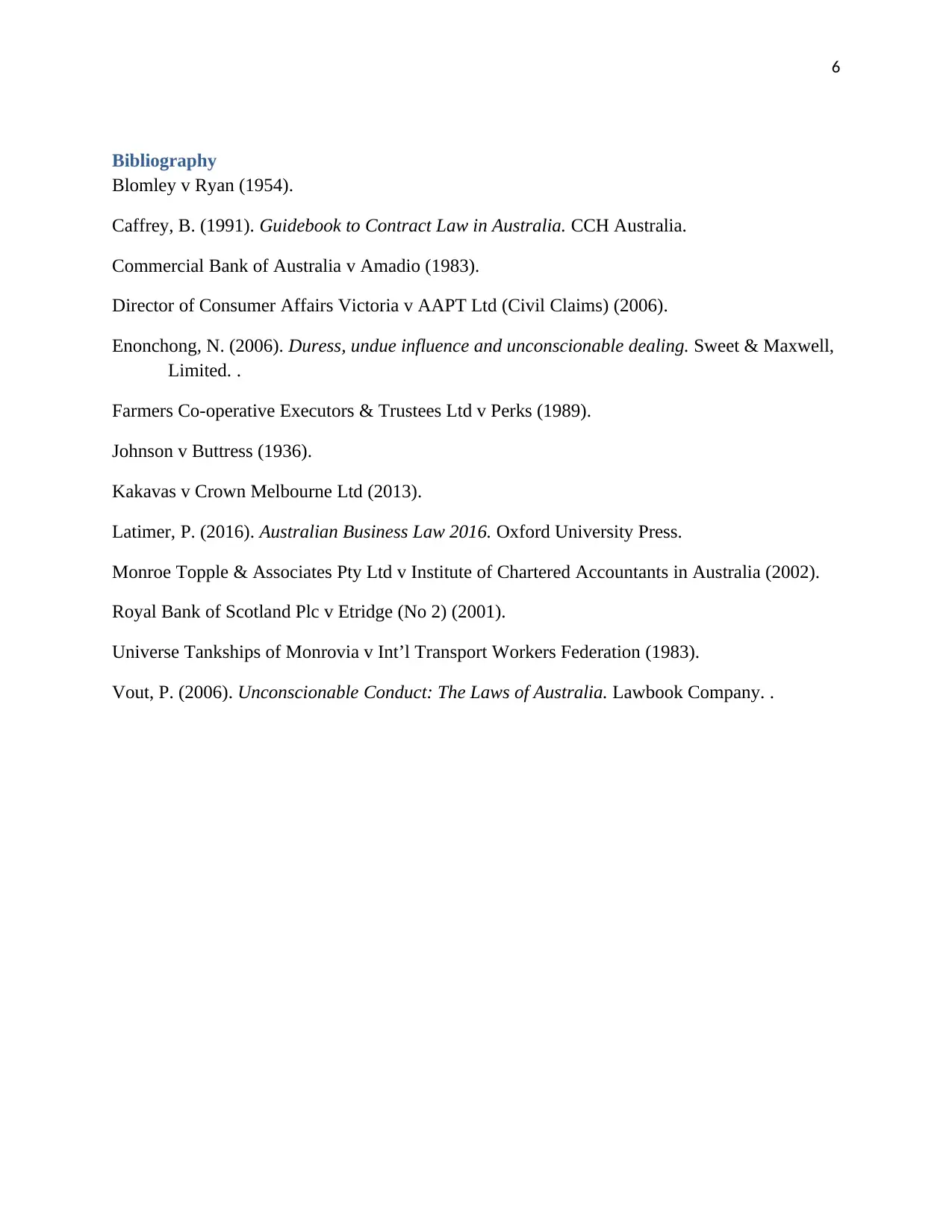
6
Bibliography
Blomley v Ryan (1954).
Caffrey, B. (1991). Guidebook to Contract Law in Australia. CCH Australia.
Commercial Bank of Australia v Amadio (1983).
Director of Consumer Affairs Victoria v AAPT Ltd (Civil Claims) (2006).
Enonchong, N. (2006). Duress, undue influence and unconscionable dealing. Sweet & Maxwell,
Limited. .
Farmers Co-operative Executors & Trustees Ltd v Perks (1989).
Johnson v Buttress (1936).
Kakavas v Crown Melbourne Ltd (2013).
Latimer, P. (2016). Australian Business Law 2016. Oxford University Press.
Monroe Topple & Associates Pty Ltd v Institute of Chartered Accountants in Australia (2002).
Royal Bank of Scotland Plc v Etridge (No 2) (2001).
Universe Tankships of Monrovia v Int’l Transport Workers Federation (1983).
Vout, P. (2006). Unconscionable Conduct: The Laws of Australia. Lawbook Company. .
Bibliography
Blomley v Ryan (1954).
Caffrey, B. (1991). Guidebook to Contract Law in Australia. CCH Australia.
Commercial Bank of Australia v Amadio (1983).
Director of Consumer Affairs Victoria v AAPT Ltd (Civil Claims) (2006).
Enonchong, N. (2006). Duress, undue influence and unconscionable dealing. Sweet & Maxwell,
Limited. .
Farmers Co-operative Executors & Trustees Ltd v Perks (1989).
Johnson v Buttress (1936).
Kakavas v Crown Melbourne Ltd (2013).
Latimer, P. (2016). Australian Business Law 2016. Oxford University Press.
Monroe Topple & Associates Pty Ltd v Institute of Chartered Accountants in Australia (2002).
Royal Bank of Scotland Plc v Etridge (No 2) (2001).
Universe Tankships of Monrovia v Int’l Transport Workers Federation (1983).
Vout, P. (2006). Unconscionable Conduct: The Laws of Australia. Lawbook Company. .
1 out of 6
Related Documents
Your All-in-One AI-Powered Toolkit for Academic Success.
+13062052269
info@desklib.com
Available 24*7 on WhatsApp / Email
![[object Object]](/_next/static/media/star-bottom.7253800d.svg)
Unlock your academic potential
© 2024 | Zucol Services PVT LTD | All rights reserved.




